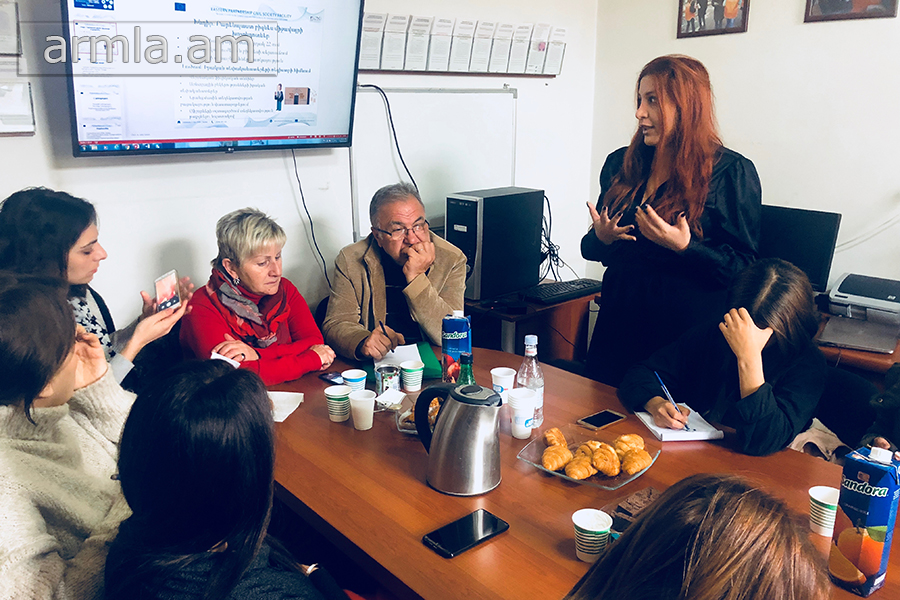
Today, on 15th of November, 2018, the first workshop on the “Introduction of the institute of beneficial ownership in RA” took place in Yerevan in the framework of the Eastern Partnership Civil Society Fellowship. The workshop has been conducted by Mariam Zadoyan, an Eastern Partnership Civil Society Fellow and the “Introduction of the institute of beneficial ownership in RA with the aim of combatting corruption” project, Program Manager.
The target group of the workshop consisted of business support organizations, youth organizations, other civil society organizations and businesses of the Shirak region, including “Youth initiative center” of Gyumri, the “Equality Index” NGO and etc.
The training had 2 parts. Firstly, Mariam represented Eastern Partnership Civil Society Fellowship Programme telling that the latter grants fellowships to young civil society activists from Armenia, Azerbaijan, Belarus, Georgia, Moldova and Ukraine to strengthen their contributions to civil society development in their respective countries. Each year 20 talented fellows, between 20 and 36 years old, are selected within the project. Fellows receive up to 5,000 EUR to develop their own activities, under the supervision of a mentor or within a certain civil society organization in the European Union or the EaP region. Mariam represented a number of golden opportunities that the fellowship provides: “Once you become part of our active alumni network, you can receive access to additional trainings, international conferences, summer schools, networking activities as well as potential support for joint activities. I had already a number of unique chances.”
Afterwards, Mariam shifted to the main topic of the workshop. “The issue of ultimate beneficial owners or controllers has become increasingly important internationally: it plays a central role in transparency, the integrity of the financial sector, and law enforcement efforts.” Beneficial owners are always natural persons who ultimately own or control a legal entity or arrangement, such as a company, a trust, a foundation, etc.
The anti-corruption expert emphasized that this phenomenon is already familiar to RA legislation, as there are some legal rules in the banking, mining and public procurement laws. However, Mariam explained, that in order to achieve tangible results in the fight against corruption, there is a need to establish a central registry of beneficial owners and to make a mandatory requirement for all the companies to provide information on their beneficial physical owners to the register.
Mariam finished her speech by representing a wide range of issues that should be put on an agenda while establishing such a register in Armenia. She noted that the current dialogue with the government on this issue is the following. “The government is ready to establish a central beneficial ownership register, but for this moment, they want to make the requirement compulsory only for certain areas”. Mariam also referred to international practice telling that she is not cognizant with any country’s regulations that pose the obligation on companies to provide information on beneficial owners only in certain sectors; hence, this attitude is very strange.
Participants also did not find any explanation why the requirement should be imposed only for this or that particular sector. Moreover, business representatives told that the proposed regulation would put a new burden on companies. Even though they agree to provide the necessary information acknowledging the public interest, they are not reluctant to do that on a selective basis. At the end of workshop, reception has been foreseen.
The article is prepared in the frameworks of the project “Introduction of the institute of beneficial ownership in RA with the aim of combatting corruption” implemented under an Eastern Partnership Civil Society Fellowship provided by EU financed “Eastern Partnership Civil Society Facility” Project, carried out by a consortium headed by GDSI Limited.
The content of the article is the sole responsibility of the author, and neither the European Union nor the implementing consortium of the “Eastern Partnership Civil Society Facility” do not bear any responsibility for it.
Zakar Iskandaryan,
Mariam Zadoyan
